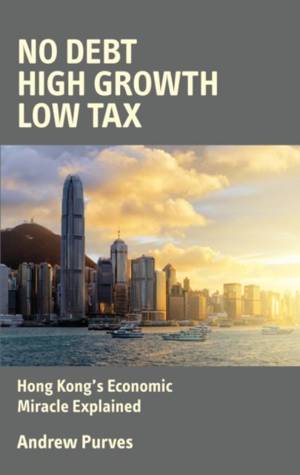
- Retrait gratuit dans votre magasin Club
- 7.000.000 titres dans notre catalogue
- Payer en toute sécurité
- Toujours un magasin près de chez vous
- Retrait gratuit dans votre magasin Club
- 7.000.000 titres dans notre catalogue
- Payer en toute sécurité
- Toujours un magasin près de chez vous
No Debt, High Growth, Low Tax
Hong Kong's Economic Miracle Explained
Andrew Purves
Livre broché | Anglais
16,45 €
+ 32 points
Description
Governments around the world are wrestling with the problems of enormous debts, low growth, high unemployment and a gap between the demands of public expenditure and what can be raised through taxation. This problem has been acute since the financial crisis, but has been a hallmark of western economies for decades. Only a few countries have been able to avoid this pattern, mostly those blest with vast natural resources such as oil. There are two small islands with no natural resources which have enjoyed high growth combined with low taxation: Hong Kong and Singapore. Nor do they have any public debts, in fact, on the contrary, they generally run a budget surplus, and investment income is a feature of their government revenue. Andrew Purves, who grew up on the island of Hong Kong, has gone beyond the conventional analysis of taxation, and asked what each jurisdiction has in common, to bring about this happy state of affairs. The result is quite surprising for two countries who sit at the top of the table for promoting free markets and other capitalist ideals of small government. All land in Hong Kong is owned by the government, who makes it available for use by lease in return for a Government Rent, while Singapore now controls two fifths of its land area, as well as significant stakes in its strategic industries, which deliver a steady stream of unconventional income. Although in Hong Kong this situation has developed almost by accident, Purves suggests that here lies a model for generating public revenue that could be adopted in other countries to allow a shift in taxation from production and consumption to the Economic Rent of land, as advocated by Adam Smith over two hundred years ago.
Spécifications
Parties prenantes
- Auteur(s) :
- Editeur:
Contenu
- Nombre de pages :
- 112
- Langue:
- Anglais
Caractéristiques
- EAN:
- 9780856835070
- Date de parution :
- 01-10-15
- Format:
- Livre broché
- Format numérique:
- Trade paperback (VS)
- Dimensions :
- 132 mm x 211 mm
- Poids :
- 158 g







